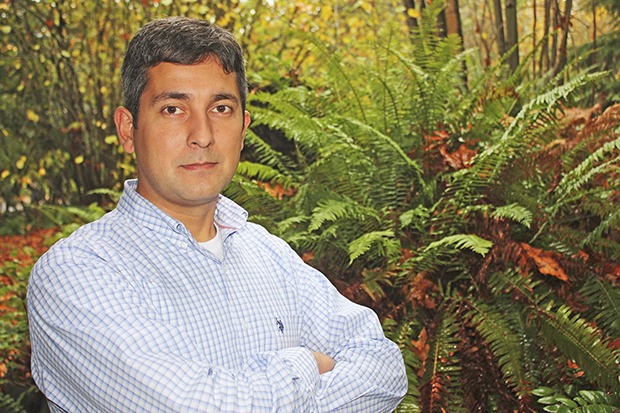From soldier to civilian, the transition can be a difficult one for today’s veteran.
Timm Lovitt should know. He completed the mission, going from the battlefield to the working world, and now uses his experiences to help veterans help themselves.
“I’m trying to help them be successful … to help them explore and understand what’s available to them,” said Lovitt, a former Army infantryman, now the director of campus veteran resources and services at Green River Community College.
Lovitt found his way, but it wasn’t easy.
He experienced combat with the Army Airborne’s 10th Mountain Division in Iraq and Afghanistan from 2002-05. His patrol withstood many nerve-jarring suicide bomb attacks and surprising episodes with improvised explosive devices.
One attack in particular stands out.
His unit was on a 12-hour patrol outside Baghdad on Sept. 14, 2005, when a car bomb explosion scattered the group. The blast shook the Humvee carrying Lovitt and three other soldiers like a “box of marbles.” It damaged the fortified truck, engulfed it in flames and left a crater in the ground.
Luckily, no one was killed in the explosion, but plenty of heads were left ringing.
Lovitt absorbed a concussion, one of several he says he sustained on two lengthy tours of duty, and was later diagnosed with a traumatic brain injury.
After serving five years in the Army, Lovitt came home with invisible wounds. He struggled with migraines, memory loss and other cognitive problems.
“I would read a page, and by the time I got to the bottom of it, I’d lost what I was reading,” he said. “At that point, I knew something was wrong.”
So Lovitt found treatment, eventually regaining his memory and rebuilding his cognitive skills.
New start, new challenges
Unsure of his future, Lovitt returned to school.
Peter Schmidt, a Veterans Training Support Center project director at Edmonds Community College, encouraged Lovitt to deal with his struggles and connected him to the right people and resources.
“He was encouraging and empowering,” Lovitt said.
Lovitt excelled in the classroom and began working with student veterans. He chartered two student clubs.
“My experiences with campus activities helped me realize that, although my time in the military had ended, my service to my nation and those around me had not,” Lovitt said.
After graduating from Edmonds, Lovitt earned his bachelor’s degree in public affairs from Seattle University and a master’s in business administration from Western Governor’s University.
Part of the first cohort of the Washington Department of Veteran Affairs, he later became its first traumatic brain injury field coordinator.
Today, the 32-year-old Lovitt – husband, father of two and proud veteran – plans to pursue a doctorate degree while continuing his work with students at Green River.
Lovitt enjoys the challenge of getting veteran students back on their feet.
Green River has a long history of supporting veterans and continues to ensure student success through comprehensive educational programs and support services.
“A good day for me is when somebody learns about our resources … and we’re able to help them,” Lovitt said.
Lovitt encourages student veterans to reach out, establish relationships and find the necessary help. Veterans often can’t make it alone.
“People will guide you during your journey, give you a shoulder to lean on and help you laugh when you need it,” he said.
Veterans need help in many ways, Lovitt said.
“The reassimilation is really quick. The general public’s understanding or expectation is that the men and women who come out of the military go through this long, detailed transition process and that they are retrained and given the right tools to be successful. That’s not what’s happening,” Lovitt said.
“The everyday Joe who comes out of the military doesn’t know how to write a resume. They don’t know how to do a job interview. They kinda know how to network but not effectively for careers,” Lovitt explained. “Most of them have never explored what they want to do. Now that they are out, they don’t realize the options.”
Lovitt says the college has stepped up. Green River keeps growing with a healthy infusion of returning veterans ready to rediscover the classroom. The college served more than 500 student veterans last year, and has helped more than 300 VA-supported student veterans so far this year, Lovitt said.
The GRCC Foundation is doing its part. Its Veterans Educational Transition (VET) Fund covers gaps in student veterans’ education benefits.
Auburn’s VFW Post 1741 and the Kent Rotary Club are among those organizations that have contributed greatly to the college’s veteran fund programs.
There are many other resources in place to help veterans, including programs that help ease the transition from combat to campus. The Washington State Department of Veterans Affairs developed the new GI Bill education benefits programs for post-9/11 veterans, providing a supportive environment and easier access to other benefits, such as academic advice, financial aid, career counseling and peer support.
Lovitt is determined to succeed and lead the college’s efforts to help more students find their way. Much more work needs to be done.
“My professional goal is to have the highest retention and completion rates of our student veterans in the state,” Lovitt said. “To move the needle … to have more student veterans graduating here.”


